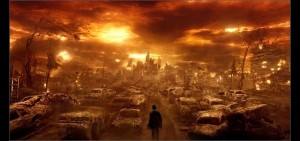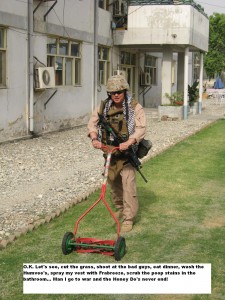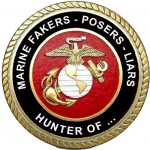Surviving the Collapse
May 6th, 2015 Posted in MilitaryI am from Bosnia. You know, between 1992 and 1995, it was hell. For one year I lived, and survived, in a city with 6,000 people, without water, electricity, gasoline, medical help, civil defense, distribution service, any kind of traditional service or centralized rule.
Our city was blockaded by the army, and for one year life in the city turned into total crap. We had no army, no police, we only had armed groups – those armed protected their homes and families.
Today me and my family are well prepared, I am well armed. I have experience.
The city was divided into communities along streets. Our street (15-20 homes) had patrols (5 armed men every week) to watch for gangs and for our enemies.
All the exchanges occurred in the street. About five kilometers away was an entire street for trading, all well organized, but going there was too dangerous because of the snipers. You could also get robbed by bandits. I only went there twice, when I needed something really rare (list of medicine, mainly antibiotics, of French origin).
Nobody used automobiles in the city: the streets were blocked by wreckage and by abandoned cars. Gasoline was very expensive. If one needed to go somewhere, that was done at night. Never travel alone or in groups that were too big – always 2-3 men. All armed, travel swift, in the shadows, cross streets through ruins, not along open streets.
There were many gangs 10-15 men strong, some as large as 50 men. But there were also many normal men, like you and me, fathers and grandfathers, who killed and robbed. There were no “good” and “bad” men. Most were in the middle and ready for the worst.
2. What about wood? Your home city is surrounded by woods, why did you burn doors and furniture?
There were not that many woods around the city. It was very beautiful – restaurants, cinemas, schools, even an airport. Every tree in the city and in the city park was cut down for fuel in the first two months.
Without electricity for cooking and heat – we burned anything that burned. Furniture, doors, flooring – that wood burns swiftly. We had no suburbs or suburban farms. The enemy was in the suburbs. We were surrounded. Even in the city, you never knew who was the enemy at any given point.
3. What knowledge was useful to you in that period?
To imagine the situation a bit better, you should know it was practically a return to the Stone Age.
For example, I had a container of cooking gas. But I did not use it for heat – that would be too expensive! I attached a nozzle to it I made myself and used to fill lighters. Lighters were precious.
If a man brought an empty lighter, I would fill it and he would give me a tin of food or a candle.
I was a paramedic. In these conditions, my knowledge was my wealth. Be curious and skilled. In these conditions, the ability to fix things is more valuable than gold.
Items and supplies will inevitably run out, but your skills will keep you fed.
I wish to say this: learn to fix things, shoes, or people.
My neighbor, for example, knew how to make kerosene for lamps. He never went hungry.
4. If you had 3 months to prepare now, what would you do?
Three months? Run away from the country? (joking)
Today I know everything can collapse really fast. I have a stockpile of food, hygiene items, batteries… enough to last me for 6 months.
I live in a very secure flat and own a home with a shelter in a village 5 kilometers away. Another six-month supply there too. That’s a small village, most people there are well prepared. The war had taught them.
I have four weapons, and 2,000 rounds for each.
I have a garden and have learned gardening. Also I have a good instinct – you know, when everyone around you keeps telling you it’ll all be fine, but I know – it will all collapse.
I have strength to do what I need to protect my family. Because when it all collapses, you must be ready to do “bad” things to keep your children alive and protect your family.
Surviving on your own is practically impossible. Even if you’re armed and ready – if you’re alone, you’ll die. I have seen that happen many times.
Families and groups, well prepared, with skills and knowledge in various fields – that’s much better.
5. What should you stockpile?
That depends. If you plan to live by theft – all you need is weapons and ammo. Lots of ammo.
If not – more food, hygiene items, batteries, accumulators, little trading items (knives, lighters, flints, soap). Also alcohol of a type that keeps well. The cheapest whiskey is a good trading item.
Many people died from insufficient hygiene. You’ll need simple items in great amounts. For example, garbage bags. Lots of them. And toilet paper. Non-reusable dishes and cups – you’ll need lots of them. I know that because we didn’t have any at all.
As for me, a supply of hygiene items is perhaps more important than food. You can shoot a pigeon, you can find a plant to eat. You can’t find or shoot any disinfectant.
Disinfectant, detergents, bleach, soap, gloves, masks…
First-aid skills, washing wounds and burns. Perhaps you will find a doctor – and will not be able to pay him.
Learn to use antibiotics. It’s good to have a stockpile of them.
You should choose the simplest weapons. I carry a Glock .45, I like it, but it’s a rare gun here – so I have two TT pistols too (everyone has them and ammo is common).
I don’t like Kalashnikovs, but again, same story – everyone has them, so do I.
You must own small, unnoticeable items. For example: a generator is good, but 1,000 Bic lighters are better. A generator will attract attention if there’s any trouble, but 1,000 lighters are compact, cheap, and can always be traded.
We usually collected rainwater into 4 large barrels and then boiled it. There was a small river, but the water in it became very dirty very fast.
It’s also important to have containers for water – barrels and buckets.
6. Were gold and silver useful?
Yes. I personally traded all the gold in the house for ammunition.
Sometimes we got our hands on money – dollars and deutschmarks. We bought some things for them, but this was rare and prices were astronomical – for example a can of beans cost $30-40. The local money quickly became worthless. Everything we needed, we traded for through barter.
7. Was salt expensive?
Yes, but coffee and cigarettes were even more expensive. I had lots of alcohol and traded it without problems. Alcohol consumption grew over 10 times as compared to peacetime. Perhaps today it’s more useful to keep a stock of cigarettes, lighters, and batteries. They take up less space.
At this time I was not a survivalist. We had no time to prepare – several days before the shit hit the fan, the politicians kept repeating over the TV that everything was going according to plan, there’s no reason to be concerned. When the sky fell on our heads, we took what we could.
8. Was it difficult to purchase firearms? What did you trade for arms and ammunition?
After the war, we had guns in every house. The police confiscated lots of guns at the beginning of the war. But most of them, we hid. Now I have one legal gun that I have a license for. Under the law, that’s called a temporary collection. If there is unrest, the government will seize all the registered guns. Never forget that.
You know, there are many people who have one legal gun – but also illegal guns if that one gets seized. If you have good trade goods, you might be able to get a gun in a tough situation, but remember, the most difficult time is the first days, and perhaps you won’t have enough time to find a weapon to protect your family. To be disarmed in a time of chaos and panic is a bad idea.
In my case – there was a man who needed a car battery for his radio, he had shotguns – I traded the accumulator for both of them. Sometimes I traded ammunition for food, and a few weeks later traded food for ammunition. Never did the trade at home, never in great amounts.
Few people knew how much, and what, I keep at home.
The most important thing is to keep as many things as possible in terms of space and money. Eventually you’ll understand what is more valuable.
Correction: I’ll always value weapons and ammunition the most. Second? Maybe gas masks and filters.
9. What about security?
Our defenses were very primitive. Again, we weren’t ready, and we used what we could. The windows were shattered, and the roofs in a horrible state after the bombings. The windows were blocked – some with sandbags, others with rocks.
I blocked the fence gate with wreckage and garbage, and used a ladder to get across the wall. When I came home, I asked someone inside to pass over the ladder. We had a fellow on our street that completely barricaded himself in his house. He broke a hole in the wall, creating a passage for himself into the ruins of the neighbor’s house. A sort of secret entrance.
Maybe this would seem strange, but the most protected houses were looted and destroyed first. In my area of the city there were beautiful houses, with walls, dogs, alarms and barred windows. People attacked them first. Some held out, others didn’t – it all depended how many hands and guns they had inside…
I think defense is very important – but it must be carried out unobtrusively. If you are in a city and SHTF comes, you need a simple, non-flashy place, with lots of guns and ammo.
How much ammo? As much as possible.
Make your house as unattractive as you can.
Right now I own a steel door, but that’s just against the first wave of chaos. After that passes, I will leave the city to rejoin a larger group of people, my friends and family.
There were some situations during the war… there’s no need for details, but we always had superior firepower, and a brick wall, on our side.
We also constantly kept someone watching the streets. Quality organization is paramount in case of gang attacks.
Shooting was constantly heard in the city.
Our perimeter was defended primitively – all the exits were barricaded and had little firing slits. Inside we had at least five family members ready for battle at any time, and one man in the street, hidden in a shelter.
We stayed home through the day to avoid sniper fire.
At first, the weak perish. Then the rest fight.
During the day, the streets were practically empty due to sniper fire. Defenses were oriented towards short-range combat alone. Many died if they went out to gather information, for example. It’s important to remember we had no information, no radio, no TV – only rumors and nothing else.
There was no organized army, every man fought. We had no choice. Everybody was armed, ready to defend themselves.
You should not wear quality items in the city – someone will murder you and take them. Don’t even carry a “pretty” long arm, it will attract attention.
Let me tell you something: if SHTF starts tomorrow, I’ll be humble. I’ll look like everyone else. Desperate, fearful. Maybe I’ll even shout and cry a little bit.
Pretty clothing is excluded altogether. I will not go out in my new tactical outfit to shout: “I have come! You’re doomed, bad guys!” No, I’ll stay aside, well armed, well prepared, waiting and evaluating my possibilities, with my best friend or brother.
Super-defenses, super-guns are meaningless. If people think they should steal your things, that you’re profitable – they will. It’s only a question of time and the amount of guns and hands.
10. How was the situation with toilets?
We used shovels and a patch of earth near the house. Does it seem dirty? It was. We washed with rainwater or in the river – but most of the time the latter was too dangerous. We had no toilet paper, and if we had any, I would have traded it away.
It was a “dirty” business.
Let me give you a piece of advice: you need guns and ammo first – and second, everything else. Literally EVERYTHING! All depends on the space and money you have.
If you forget something, there’ll always be someone to trade with for it – but if you forget weapons and ammo, there will be no access to trading for you.
I don’t think big families are extra mouths. Big families means both more guns and strength – and from there, everyone prepares on his own.
11. How did people treat the sick and the injured?
Most injuries were from gunfire. Without a specialist and without equipment, if an injured man found a doctor somewhere, he had about a 30% chance of survival.
It ain’t the movies. People died. Many died from infections of superficial wounds. I had antibiotics for 3-4 uses – for the family, of course.
People died foolishly quite often. Simple diarrhea will kill you in a few days without medicine, with limited amounts of water.
There were many skin diseases and food poisonings… nothing to it.
Many used local plants and pure alcohol – enough for the short term, but useless in the long term.
Hygiene is very important… as well as having as much medicine as possible. Especially antibiotics.
Top 100 Items to Disappear First During a National Emergency
1. Generators (Good ones cost dearly. Gas storage, risky. Noisy…target of thieves; maintenance etc.)
2. Water Filters/Purifiers
3. Portable Toilets
4. Seasoned Firewood. Wood takes about 6 – 12 months to become dried, for home uses.
5. Lamp Oil, Wicks, Lamps (First Choice: Buy CLEAR oil. If scarce, stockpile ANY!)
6. Coleman Fuel. Impossible to stockpile too much.
7. Guns, Ammunition, Pepper Spray, Knives, Clubs, Bats & Slingshots.
8. Hand-can openers, & hand egg beaters, whisks.
9. Honey/Syrups/white, brown sugar
10. Rice – Beans – Wheat
11. Vegetable Oil (for cooking) Without it food burns/must be boiled etc.,)
12. Charcoal, Lighter Fluid (Will become scarce suddenly)
13. Water Containers (Urgent Item to obtain.) Any size. Small: HARD CLEAR PLASTIC ONLY – note – food grade if for drinking.
16. Propane Cylinders (Urgent: Definite shortages will occur.)
17. Survival Guide Book.
18. Mantles: Aladdin, Coleman, etc. (Without this item, longer-term lighting is difficult.)
19. Baby Supplies: Diapers/formula. ointments/aspirin, etc.
20. Washboards, Mop Bucket w/wringer (for Laundry)
21. Cookstoves (Propane, Coleman & Kerosene)
22. Vitamins
23. Propane Cylinder Handle-Holder (Urgent: Small canister use is dangerous without this item)
24. Feminine Hygiene/Haircare/Skin products.
25. Thermal underwear (Tops & Bottoms)
26. Bow saws, axes and hatchets, Wedges (also, honing oil)
27. Aluminum Foil Reg. & Heavy Duty (Great Cooking and Barter Item)
28. Gasoline Containers (Plastic & Metal)
29. Garbage Bags (Impossible To Have Too Many).
30. Toilet Paper, Kleenex, Paper Towels
31. Milk – Powdered & Condensed (Shake Liquid every 3 to 4 months)
32. Garden Seeds (Non-Hybrid) (A MUST)
33. Clothes pins/line/hangers (A MUST)
34. Coleman’s Pump Repair Kit
35. Tuna Fish (in oil)
36. Fire Extinguishers (or..large box of Baking Soda in every room)
37. First aid kits
38. Batteries (all sizes…buy furthest-out for Expiration Dates)
39. Garlic, spices & vinegar, baking supplies
40. Big Dogs (and plenty of dog food)
41. Flour, yeast & salt
42. Matches. {“Strike Anywhere” preferred.) Boxed, wooden matches will go first
43. Writing paper/pads/pencils, solar calculators
44. Insulated ice chests (good for keeping items from freezing in Wintertime.)
45. Workboots, belts, Levis & durable shirts
46. Flashlights/LIGHTSTICKS & torches, “No. 76 Dietz” Lanterns
47. Journals, Diaries & Scrapbooks (jot down ideas, feelings, experience; Historic Times)
48. Garbage cans Plastic (great for storage, water, transporting – if with wheels)
49. Men’s Hygiene: Shampoo, Toothbrush/paste, Mouthwash/floss, nail clippers, etc
50. Cast iron cookware (sturdy, efficient)
51. Fishing supplies/tools
52. Mosquito coils/repellent, sprays/creams
53. Duct Tape
54. Tarps/stakes/twine/nails/rope/spikes
55. Candles
56. Laundry Detergent (liquid)
57. Backpacks, Duffel Bags
58. Garden tools & supplies
59. Scissors, fabrics & sewing supplies
60. Canned Fruits, Veggies, Soups, stews, etc.
61. Bleach (plain, NOT scented: 4 to 6% sodium hypochlorite)
62. Canning supplies, (Jars/lids/wax)
63. Knives & Sharpening tools: files, stones, steel
64. Bicycles…Tires/tubes/pumps/chains, etc
65. Sleeping Bags & blankets/pillows/mats
66. Carbon Monoxide Alarm (battery powered)
67. Board Games, Cards, Dice
68. d-con Rat poison, MOUSE PRUFE II, Roach Killer
69. Mousetraps, Ant traps & cockroach magnets
70. Paper plates/cups/utensils (stock up, folks)
71. Baby wipes, oils, waterless & Antibacterial soap (saves a lot of water)
72. Rain gear, rubberized boots, etc.
73. Shaving supplies (razors & creams, talc, after shave)
74. Hand pumps & siphons (for water and for fuels)
75. Soysauce, vinegar, bullions/gravy/soupbase
76. Reading glasses
77. Chocolate/Cocoa/Tang/Punch (water enhancers)
78. “Survival-in-a-Can”
79. Woolen clothing, scarves/ear-muffs/mittens
80. Boy Scout Handbook, / also Leaders Catalog
81. Roll-on Window Insulation Kit (MANCO)
82. Graham crackers, saltines, pretzels, Trail mix/Jerky
83. Popcorn, Peanut Butter, Nuts
84. Socks, Underwear, T-shirts, etc. (extras)
85. Lumber (all types)
86. Wagons & carts (for transport to and from)
87. Cots & Inflatable mattress’s
88. Gloves: Work/warming/gardening, etc.
89. Lantern Hangers
90. Screen Patches, glue, nails, screws,, nuts & bolts
91. Teas
92. Coffee
93. Cigarettes
94. Wine/Liquors (for bribes, medicinal, etc,)
95. Paraffin wax
96. Glue, nails, nuts, bolts, screws, etc.
97. Chewing gum/candies
98. Atomizers (for cooling/bathing)
99. Hats & cotton neckerchiefs
100. Livestock
—
Tags: how do I survive, survival advice, what supplies do I need for an EMP attack






